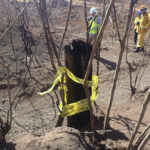A judge dealt a potential setback Wednesday to the state’s landmark lawsuit against former makers of lead paint, preventing two key witnesses from testifying about how much has been spent to combat the problem in Rhode Island.
The dollar figures cited by the witnesses would not have distinguished between problems caused by lead paint and those from other sources of lead, such as gasoline or contaminated water, industry lawyers said.
The state alleges the paint companies made a product that creates a public nuisance and continues to poison children and contaminate homes. The state is seeking to hold the companies responsible for cleaning up the problem, and says the overwhelming source of lead exposure in Rhode Island is from paint.
Superior Court Judge Michael Silverstein said juries cannot decide damages based on speculation or conjecture and ruled that testimony from the two witnesses would be unfair to the defendants.
The attorney general’s office called the ruling a “minor setback.”
“Although we’re disappointed by it and will consider our options about addressing it, it won’t stop us from reaching our goal,” Attorney General Patrick Lynch said a statement.
Lawyers for the state told Silverstein on Wednesday the witnesses planned to testify that the state has spent about $27 million on expenses directly related to lead paint.
The state still plans to seek damages for future clean-up expenses, and Lynch said the total cost could be billions of dollars.
Jack McConnell, a lawyer for the state, asked the judge to remove the question of past damages from the trial, and revisit the issue if the jury finds in the state’s favor.
The judge did not immediately rule on the motion and said he would allow the defendants a chance to respond.
The defendants are the Sherwin-Williams Co., Atlantic Richfield Co., NL Industries, Inc. and Millennium Holdings LLC.
Rhode Island’s lawsuit, filed in 1999, was the first attempt by a state to hold the industry responsible for the dangers of lead paint in old buildings. An earlier trial ended in 2002 with a hung jury.
Was this article valuable?
Here are more articles you may enjoy.

 Hawaiian Electric Hits 40-Year Low Ahead of Maui Fire Report
Hawaiian Electric Hits 40-Year Low Ahead of Maui Fire Report  Vintage Ferrari Owners’ Favorite Mechanic Charged With Theft, Fraud
Vintage Ferrari Owners’ Favorite Mechanic Charged With Theft, Fraud  Supplemental Claims Don’t Need to Include Damage Estimates, Fed Appeals Court Says
Supplemental Claims Don’t Need to Include Damage Estimates, Fed Appeals Court Says  Viewpoint: The Impact of Behavioral Health on Workers’ Comp
Viewpoint: The Impact of Behavioral Health on Workers’ Comp 